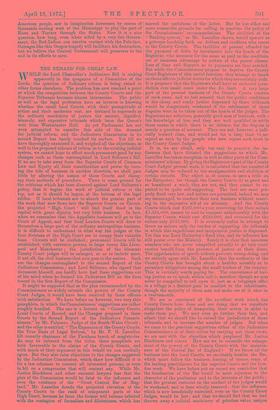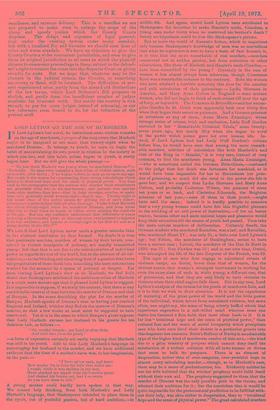THE DEMAND FOR CHEAP LAW.
NIHILE the Lord Chancellor's Judicature Bill is sinking apparently in the quagmire of a Committee of the Lords, the question of Judiciary reform is being raised in other forms elsewhere. The problem has now reached a point at which the competition between the County Courts and the Superior Tribunals becomes almost internecine. The public as well as the legal profession have an interest in knowing whether the small local Courts, with their promptitude of action and their moderate cost, are destined to supersede as the ordinary machinery of justice the ancient, dignified, leisurely, and expensive tribunals which issue the Queen's writ from Westminster Hall. As yet Parliament has not even attempted to consider this side of the demand for judicial reform, and the Judicature Commission in its second Report has barely touched its surface. Yet till we have thoroughly examined it, and weighed all the objections, as well to the proposed scheme of reform as to the existing judicial system, we cannot hope to effect much permanent good by any changes such as those contemplated in Lord Selborne's Bill. If we are to take away from the Superior Courts of Common Law and Equity all their consideration and power by turn- ing the tide of business in another direction, we shall gain little by altering the names of those Courts and chang- ing their methods of procedure. There is some ground for the criticism which has been directed against Lord Selborne's policy, that it begins the work of judicial reform at the top, not as it should be begun, at the bottom of the legal edifice. If local tribunals are to absorb the greater part of the work that now flows into the Superior Courts on Circuit, the projected " High Court " will find itself fixed in the capital with great dignity, but very little business. In fact, when we remember that the Appellate business will go to the Court of Appeal, and that local London Courts will draw to themselves a large part of the ordinary metropolitan business, it is difficult to understand in what way the judges of the four divisions of the High Court are to occupy their valuable time. Circuits will be abolished ; permanent Courts will be established, with extensive powers, in large towns like Liver- pool and Manchester ; the jurisdiction of the itinerant County Court judges will be enlarged, so as to include most, if not all, the civil business that now goes to the assizes. Such are the changes contemplated in the second Report of the Judicature Commission ; and Lord Selborne, who signed that document himself, can hardly have had these suggestions out of his mind when he framed his Judicature Bill on the lines traced in the first Report of the Commission.
It might be supposed that as the plan recommended by the Commissioners so widely extends the powers of the County Court Judges, it would have been received by those officers with satisfaction. We have before us, however, two very able pamphlets, in which the Commissioners' suggestions are rather roughly handled. The one is a lecture on " County Courts, Local Courts of Record, and the Changes proposed in these Courts by the Second Report of the Judicature Commis- sioners," by Mr. Falconer, Judge of the South-Wales Circuit ; and the other is entitled, " The Expansion of the County Courts, the True Basis of Legal Reform," by Mr. F. H. Lascelles, till recently chairman of the Farnham bench of magistrates. As may be inferred from the titles, these pamphlets are both favourable to the claims of the County Courts, and with much of their argument in this behalf we can cordially agree. But they also raise objections to the changes suggested by the Judicature Commission, which show how difficult it is for a law reformer to content all interested persons, or even to hit on a compromise that will content any. While Mr. Justice Blackburn and other eminent lawyers fear that the plan of the Commission would be fatal to the influence and even the existence of the " Great Central Bar of Eng- land," Mr. Lascelles dreads the projected elevation of the County Courts to the rank of component parts of the High Court, because he fears the former will become infected with the contagion of formalism and dilatoriness, which has marred the usefulness of the latter. But he has other and more reasonable grounds for calling in question the policy of the Commissioners' recommendations. The abolition of the " Banking system," as Mr. Lascelles shows, would operate as a grievous hardship both on debtors and creditors who resort to the County Courts. The facilities at present afforded for the payment of debts by instalments into the hands of the Registrar, who accounts for the sums so paid to the creditors, are of immense advantage to suitors of the poorer classes. Loss of time and disputes as to payments are thus avoided. But while the Commissioners propose to deprive the County Court Registrars of this useful function, they attempt to throw on those officers judicial duties for which they are certainly unfit. It is proposed that the Registrars shall have an exclusive juris- diction over small cases under the £5 limit. A very large part of the present business of the County Courts consists of such cases, and we feel assured that the public confidence in the cheap and ready justice dispensed by those tribunals would be dangerously weakened if the settlement of these disputes were to be taken out of the hands of the judges. The Registrars are solicitors, generally good men of business, with a fair knowledge of law, and they are well qualified to settle those causes in which there is no defence, but the dispute is merely a question of account. They are not, however, a judi- cially trained class, and would not for a long time be ac- cepted as such by the people who now repose such trust in the County Court Judges.
It is, we are afraid, only too easy to perceive the in- fluences that have dictated the suggestions to which Mr. Lascelles has taken exception, as well as other parts of the Com- missioners' scheme. By giving the Registrars apart of the County Court Judges' present work, it is calculated that the number of Judges may be reduced by the amalgamation and abolition of certain circuits. The object is, of course, to save a trifle on the Estimates ; for though the County Courts do so great and so beneficent a work, they are not, and they cannot be ex- pected to be, quite self-supporting. The fees are most pro- perly fixed very low, and suitors are permitted, indeed we may say encouraged, to conduct their own business without resort- ing to the expensive aid of an attorney. And the County Courts which cost £507,000 a year, recovering for their suitors £1,324,000, cannot be said to compare unfavourably with the Superior Courts, which cost £649,000, and recovered for the suitors only £347,000. It is extremely unfair to attempt to throw on suitors only the burden of supporting the tribunals in which this expeditious and inexpensive justice is dispensed. Yet this was Lord Hatherley's fixed idea, and its influence has still power over the Ministry. Surely it is clear that immense numbers who are never compelled actually to go into court receive benefit from the presence of justice at their doors. The apprehension of speedy redress prevents wrong-doing, and we entirely agree with Mr. Lascelles that the authority of the County Courts has brought about a healthy morality as to pecuniary obligations among the small traders of the country. This is certainly worth paying for. The convenience of hav- ing justice, so to speak, within call is manifest, though we may never be compelled to call upon it, just as a telegraph office in a village is a distinct gain in comfort to the inhabitants, though the majority of them may not make use of it once in a twelvemonth.
We are so convinced of the excellent work which the County Courts have done and are doing, that we repudiate altogether the policy of hampering their action in order to make them pay. We may even go further than this, and admit that we should like to extend the jurisdiction of these tribunals, and to increase the number of judges. But when we come to the practical suggestions either of the Judicature Commissioners or of their critics for carrying out these views, we are met with the objection which perplexed Mr. Justice Blackburn and others. How are we to reconcile the enlarge- ment of the powers of the County Courts with the mainten- ance of the Central Bar of England ? If we throw all the business into the local Courts, we inevitably localise the Bar, which must follow the business, leaving, of course, some of the leading practitioners for the superior Courts and the Lon- don work. We have before put on record our conviction that the localisation of the Bar would be most injurious to the character of the profession and to the interests of the public ; that the greatest restraint on the conduct of the judges would be weakened, and in time wholly removed ; that the influence which is now beneficially exercised, even on the County Court Judges, would be lost ; and that we should find that we had thrown away a judicial machinery of priceless value, unique
excellence, and extreme delicacy. This is a sacrifice we are not prepared to make, even to enlarge the scope of the cheap and speedy justice which the County Courts
dispense. The delays - and expenses of legal proceed- ings under the existing system cause many scandals, but with a localised Bar and business we should soon hear of other and worse scandals. We have no objection to give the County Courts a wider concurrent jurisdiction, and even to give them an original jurisdiction in all cases in which the plaintiff chooses to commence proceedings in them, subject to the defend- ant's right to remove the cause into the Superior Court on giving security for costs. Bat we hope that, whatever may be the changes in the judicial system, the Circuits, or something answering to them, will be retained. The difficulties at pre- sent experienced arise, partly from the absurd old distinctions of the law terms, which Lord Selborne's Bill proposes to abolish, and partly from the insufficient number of judges available for itinerant work. But surely the country is rich enough to pay for more judges, instead of scheming, as our law reformers seem bound to do, for the reduction of the present staff.



































 Previous page
Previous page